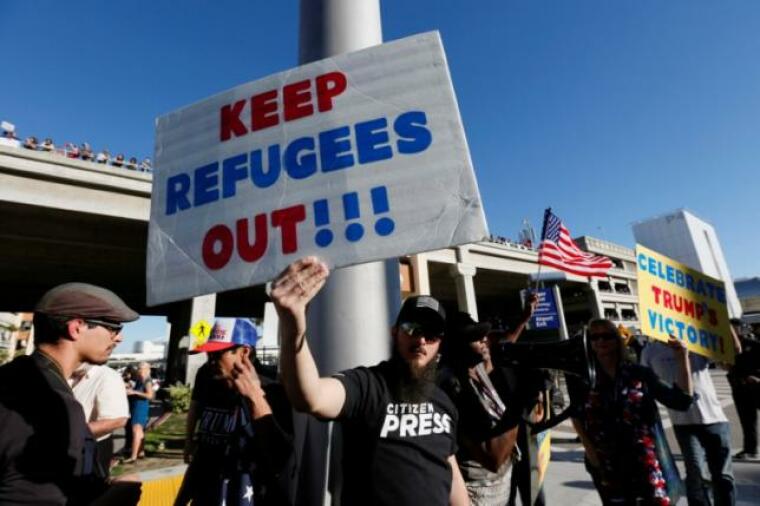Working-class voters' support for Trump was motivated by fear of societal change, says PRRI report

A new study has suggested that the support white working-class voters gave Donald Trump in the previous election was not motivated by their economic troubles but by their fear of societal change in the U.S.
An analysis of post-election survey data conducted by the Public Religion Research Institute (PRRI) and The Atlantic revealed that many financially troubled voters in the white working class were more likely to support Hillary Clinton over Trump by a ratio of two to one.
White working-class voters who reported feeling like a stranger in the U.S. and believed protections were needed against foreign influence were 3.5 times more likely to support Trump. Those who favored deporting immigrants living in the country illegally were 3.3. times more likely to prefer Trump than those who did not.
The analysis also indicated that white working-class voters who reported being in fair or poor financial shape were 1.7 times more likely to support Clinton than those who were in better financial shape.
While opposition to cultural change was a major factor, the authors noted that gender roles and attitudes about race were not significant demographic factors in the model of the new analysis.
In September and October 2016, PRRI and The Atlantic surveyed white, working-class voters without college degrees or salaried jobs. This demographic makes up more than one-third of American adults. When the researchers returned to the group in November to see how its members voted, they discovered that 64 percent of white working-class voters chose Trump, while only 32 percent supported Clinton.
Non-college-educated voters tend to support Republicans, but Trump won them over by a larger margin than any presidential candidate since 1980, according to a study conducted by the Pew Research Center.
The report also showed that 68 percent of white working-class voters say that the U.S. is in danger of losing its identity, and 62 percent believe that the growing number of immigrants pose a threat to the country's culture. More than half say discrimination against whites was as much of a problem as discrimination against minorities.
The researchers also found that white working-class voters who believe that investing in college education is a risky gamble were almost twice as likely to support Trump compared to their peers.
"The enduring narrative of the American dream is that if you study and get a college education and work hard, you can get ahead," said Robert P. Jones, the CEO of PRRI.
"The survey shows that many white working-class Americans, especially men, no longer see that path available to them. ... It is this sense of economic fatalism, more than just economic hardship, that was the decisive factor in support for Trump among white working-class voters," he added.
 Christians don't have to affirm transgenderism, but they can’t express that view at work: tribunal
Christians don't have to affirm transgenderism, but they can’t express that view at work: tribunal Archaeology discovery: Medieval Christian prayer beads found on Holy Island
Archaeology discovery: Medieval Christian prayer beads found on Holy Island Presbyterian Church in America votes to leave National Association of Evangelicals
Presbyterian Church in America votes to leave National Association of Evangelicals Over 50 killed in 'vile and satanic' attack at Nigerian church on Pentecost Sunday
Over 50 killed in 'vile and satanic' attack at Nigerian church on Pentecost Sunday Ukrainian Orthodox Church severs ties with Moscow over Patriarch Kirill's support for Putin's war
Ukrainian Orthodox Church severs ties with Moscow over Patriarch Kirill's support for Putin's war Islamic State kills 20 Nigerian Christians as revenge for US airstrike
Islamic State kills 20 Nigerian Christians as revenge for US airstrike Man who served 33 years in prison for murder leads inmates to Christ
Man who served 33 years in prison for murder leads inmates to Christ


 Nigerian student beaten to death, body burned over ‘blasphemous’ WhatsApp message
Nigerian student beaten to death, body burned over ‘blasphemous’ WhatsApp message 'A new low': World reacts after Hong Kong arrests 90-year-old Cardinal Joseph Zen
'A new low': World reacts after Hong Kong arrests 90-year-old Cardinal Joseph Zen Iran sentences Christian man to 10 years in prison for hosting house church worship gathering
Iran sentences Christian man to 10 years in prison for hosting house church worship gathering French Guyana: Pastor shot dead, church set on fire after meeting delegation of Evangelicals
French Guyana: Pastor shot dead, church set on fire after meeting delegation of Evangelicals ‘Talking Jesus’ report finds only 6% of UK adults identify as practicing Christians
‘Talking Jesus’ report finds only 6% of UK adults identify as practicing Christians Mission Eurasia ministry center blown up in Ukraine, hundreds of Bibles destroyed: 'God will provide'
Mission Eurasia ministry center blown up in Ukraine, hundreds of Bibles destroyed: 'God will provide' Church holds service for first time after ISIS desecrated it 8 years ago
Church holds service for first time after ISIS desecrated it 8 years ago Burger King apologizes for 'offensive campaign' using Jesus' words at the Last Supper
Burger King apologizes for 'offensive campaign' using Jesus' words at the Last Supper Uganda: Muslims abduct teacher, burn him inside mosque for praying in Christ’s name
Uganda: Muslims abduct teacher, burn him inside mosque for praying in Christ’s name